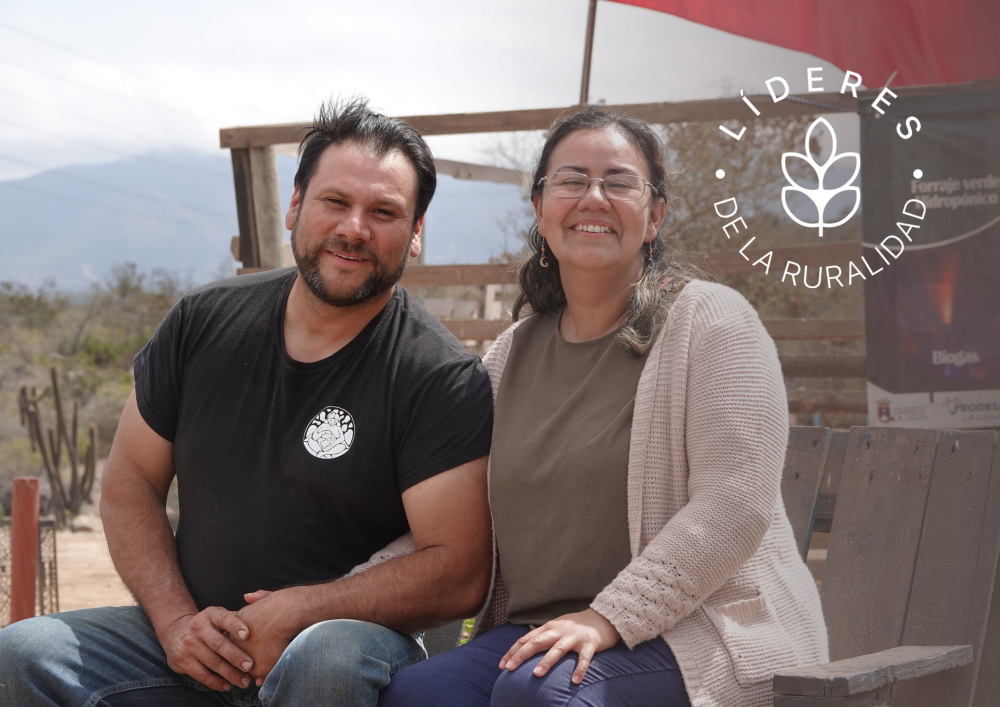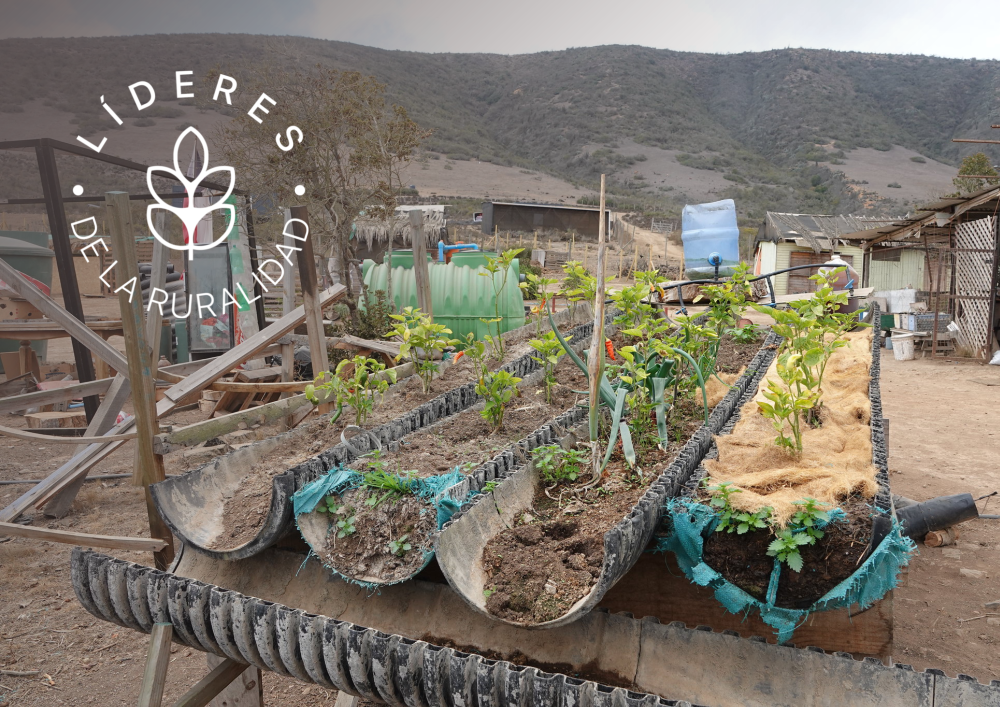The couple established an agroecological farm with an integrated system that includes the recycling of water. They produce food for personal consumption and surplus supplies are traded with neighbors.

Santiago, 03 October 2022 (IICA). Macarena Valdés and Marco Aceituno are the founders and owners of Granja La Pachamama – a farm whose food production flourished amidst the severe drought that has been clobbering Chile for 12 years, clearly demonstrating the concept of producing more with less. As such, they were recognized as “Leaders of Rurality” by the Inter-American Institute for Cooperation on Agriculture (IICA).
The couple will receive the “Soul of Rurality” award, which is part of an initiative by the specialized agency in agricultural and rural development to pay tribute to men and women who are leaving their mark and making a difference in the rural communities of the Americas, a key region for food and nutritional security and the environmental sustainability of the planet.
Macarena and Marco live with their three children and operate a production enterprise in the hills of Los Molles municipality in the central region of Valparaíso. Like many residents in the central and northern areas of this South American country, each month they receive 5,000 liters of water, delivered to them by water truck.
By introducing an integrated system that includes the recycling of water, they have been able to establish an agroecological farm to grow food for personal consumption; the excess supply is used to barter with their neighbors. They also rear animals. The farm has three solar panels for electricity production and a biodigester that converts organic waste from the production animals into biogas.
The Leaders of Rurality award recognizes individuals who are playing a critical dual role as guarantors of food and nutritional security and custodians of the planet’s biodiversity, by producing under all kinds of circumstances. The recognition also highlights the capacity to put forward positive examples for the region’s rural areas.
An example of the circular economy in agriculture that is attracting attention in Chile
Macarena Valdés and Marco Aceituno are one married couple who never dreamed of living in the countryside. However, everything changed one day when unexpected circumstances compelled them to start their lives over.
Having been deprived of any source of income, they left the Chile’s capital, Santiago, with their three children and moved to the countryside. The prospects were daunting: they had no money to assist them to maintain a business and they had no farming experience.
To make matters worse, this was taking place towards the end of 2019, a time of social unrest in Chile, when people from all across the country were taking to the streets to voice their dissatisfaction. Within the country, there was a prevailing mood of uncertainty about the immediate future.
The family was headed for a small three-hectare plot in the district of Los Mellos, which is 140 kilometers from the city of Valparaíso in the center of the country. “We settled on a little hillock that is 7 kilometers from the Los Molles village and 5 kilometers from our closest neighbor. We had no electricity, water or gas. We were unemployed. We knew nothing about agriculture and had to reinvent ourselves, because we were accustomed to buying our food in a supermarket”, recalls Macarena.
“We were clueless about what a farmer’s life was like and people told us that our land was unsuitable for almost every kind of crop, because the soil was covered in a thick layer of clay. We got there at the height of the social upheaval and the first thing we learned was how to use charcoal, gravel and sand to filter the water from the well. The cows would drink from the same well that provided drinking water for our children and ourselves”, remarked Marco.
That beginning is just a distant memory now. Now just three years since that difficult first phase, Macarena and Marco have managed to create the Granja La Pachamama, a self-sustaining agricultural production business that they hope to replicate in other parts of the country. It is located in one of the areas that has been most hard-hit by the historic 12-year drought in Chile and that is a source of concern in the country.
“The satisfaction that you see today is because we were able to demonstrate that there is a circular economy and that it can be achieved. We are not engineers. Necessity was our motivating factor and we learned everything that we know from videos uploaded to the internet. Today we want to share our knowledge with those who need it”, insists Marco.
Tackling the drought
As a means of tackling the persistent drought, like many locations and many rural residents, this family receives a supply of water from the State. Each month, water trucks, which in Chile are known as camiones aljibe, deliver 5,000 liters of water – an amount that is insufficient to satisfy the needs of a rural family.
Thus, they had to learn to recycle it. Today, all of the water used to irrigate one type of crop is re-used on other crops, thereby avoiding waste. The couple introduced a drip irrigation system, using conduits that they both built. The water runs along the field and at the end is collected in a bucket, now enriched with new nutrients, to be re-used on other vegetables.

Today, the organic farm produces potato, onion, carrot, paprika, tomato and all the other vegetables and fruit that the family consumes. The surplus is traded with neighbors in the area, in exchange for other products.
The La Pachamama operation also boasts two biodigestors that convert organic matter into biogas to produce electricity that is used in the home, in the event that the solar panels are malfunctioning. Thus, the house operates independently from the central electricity grid.
Marco and Macarena also take the vegetable oil that is produced to manufacture biodiesel, which they use to fuel their vehicle. Glycerin, on the other hand, is used to make soaps and detergents. They produce hydroponic fodder to feed their animals, which include alpacas, pigs, chickens, donkeys, sheep and cows, without the need to depend on the natural pastures, which have often dried out due to the lack of water.
Marco explains that, “We had to seek out alternatives. We wanted to be self-sufficient and learned about the circular economy. We tried to use everything that we had at hand in a very simple way. These are things that you turn to only out of necessity and we want to pass the knowledge on, because there are people who are truly suffering. This is not a project, but a way of life”.
La Granja La Pachamama has received support from IICA and various public and private institutions in Chile. The Institute of Agricultural Research (INIA)—an innovation institution linked to the Ministry of Agriculture—and the Agricultural Research Foundation (FIA) consider it to be a national example of the circular economy and agroecology, proving that it is possible to optimize water use under extreme drought conditions and to find a second use for recyclable waste, thereby minimizing the impact on the environment.
Thus, INIA and FIA are spearheading the implementation of an Agroecology and Circular Economy Extension Center on the farm, which features new sustainable practices and is streamlining the current sustainable production system, by optimizing the use of resources in a region with extreme water limitations.
According to Macarena, “Farmers must understand that we can overcome difficult situations and that new experiences are not necessarily negative. There will be a tomorrow and a future if communities work together, despite limited water and financial resources”.
In closing, Marco stresses that, “We don’t want to create false expectations but we do want to share our testimony. We do not pretend to know everything and we have no magic wand. However, we know that there is hope for farmers, if rural families receive support to stay afloat”.
More information:
Institutional Communication Division
comunicacion.institucional@iica.int











